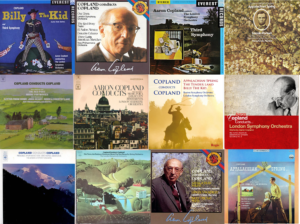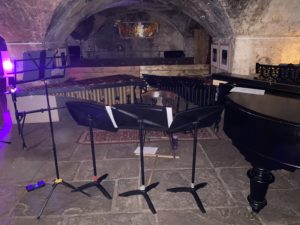
Copland was a fabulously talented composer who had the ability not only to paint pictures with his music but also describe many complex emotions. When he wasn’t writing programme music for ballets and film he was generally very helpful to the casual listener composing pieces with names that often described the feeling he was trying to convey. For examples listen to Statements, Three Moods for Piano, Letter from Home and Four Piano Blues. Based on a lifetime of listening, I’ve distilled down the different types of Copland endings into eight different categories. Find the first set here. Now sit back, relax and get ready to enjoy the next four types.
5. The Volcanic Eruption
Some of Copland’s endings are incredibly violent in terms of their full on assault with a sizable percussion battery and fortissimo brass and woodwinds. The most severe of these has to be Connotations for Orchestra but there are frankly many other pieces that also can blow you away with their raw intensity.
Unfortunately, of all Copland’s endings this category is the type that is the least likely to be heard in concert venues. What an incredible shame this is! I personally think that all these pieces would certainly get audiences talking. Love them or hate them, you’d have an opinion for sure and that has to be a good thing. As Copland said himself
Most people use music as a couch; they want to be pillowed on it, relaxed and consoled for the stress of daily living. But serious music was never meant to be soporific
This is not the playlist for anyone who wants music to lull them to sleep!
6. The Full Stop/The Perfect Chord
You know that these pieces have finished as they all have a full stop at the end. Some of these endings share a kinship with the abrupt end. For instance, the Piano Concerto, Piano Variations and Proclamation replace the full stop with a very large exclamation mark! This is what Copland referred to as his “laying down the law” style. Many of his shorter form and simpler piano pieces such as Down a Country Lane, In Evening Air and Midsummer Nocturne conclude with a crystalline purity “like a prayer”.
7. The Ambiguous End
These endings share a similar feel to the strong silent type endings. However, they tend to be somewhat more unsettling, simply petering out with no real satisfactory resolution. Instead of being determined there is a distinct feeling of resignation. For instance, the listener is left with the impression that although the protagonists in Quiet City and Night Thoughts may have drifted off to sleep, that their problems are well and truly still there to chew on in the morning.
This ending seems quite characteristic of late Copland. Inscape should also feature in this list. In this case you are desperate for a final note that doesn’t come. With Jingo (from Statements) and Dance Panels it’s almost possible to see and hear the music disappearing in the distance and then being lost over a hill.
8. Ecstasy, Conviction and Zeal
Copland was commissioned to write a good deal of programme music during his career and as such there would have been a defined brief to work towards. Many of these pieces were penned during the War years and therefore he would have been looking to provide an ending that defined a spirit of working together to achieve a noble cause. Embued within these pieces is a granite like strength of the righteous and an unwavering certainty that God is on their side.
Notable Copland endings of this type include works like Lincoln Portrait, Fanfare for the Common Man and Premable for a Solemn Occasion composed during and after World War II but he also used it during his own stand against authoritarianism. Both The Promise of Living (from the opera The Tender Land) and The Canticle of Freedom were written around the time that Copland was interviewed by the House of UnAmercian Activities in 1953. Also, listen closely to the lyrics of finale to The Second Hurricane. The exuberant New Deal optimism, leftist stance and sentiments such as “Everybody is good as everbody else” would have been part of the reason that Copland got into trouble with Senator Joseph McCarthy in the first place!






Leave a Comment